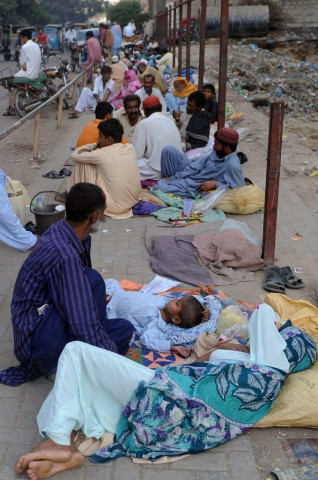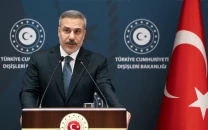Below the line: Increasing poverty affecting 40% population, says report
With 77 million food-insecure people, 40 per cent of population is below poverty line.

With 77 million food-insecure people, 40 per cent of population is below poverty line. PHOTO: AFP
Increasing poverty levels over the past decade are now affecting 40 per cent of Pakistan’s population. according to independent research studies.
With approximately 77 million food-insecure people, poverty is the most important challenge for the government.
At the second annual conference of the Pakistan Strategy Support Program (PSSP) held here Tuesday, researchers and economists from across the country joined international consultants to present the findings of some recently conducted surveys.

While presenting trends in poverty, Edward Whitney from PSSP said that poverty rates had increased over the last decade, though rural poverty is persistently higher than urban poverty.
According to the International Food Policy Research Institute (IFPRI), in 2011, Pakistan was among the 26 countries having alarming levels of hunger. IFPRI Visiting Senior Research Fellow Sohail Jehangir Malik gave a presentation on the consumer price index (CPI) and its implications on welfare, saying that increasing unemployment and rising prices were resulting in loss of welfare.

Malik said the Food Price Index had been increasing at a substantially greater rate than the General Price Index since 2007-08. He said the recent work confirms that dramatically declining estimates of poverty are a direct result of use of CPI to calculate the poverty line.
“Nearly half the population of Pakistan was declared food insecure in 2008,” he said.
Malik said that wheat is central to food security in Pakistan but wheat prices have implications for the consumers. He informed that wheat accounts for over 55 per cent of the total caloric consumption and poor households spend 24 per cent of food expenditure on wheat.
Federal Minister for Planning and Development Ahsan Iqbal noted that poverty had gone from 34 per cent in 2007 to 40 per cent in 2012 and was adding to the already-substantial number of development challenges. Iqbal said to combat the menace, Pakistan must embrace a research and evidence-based policy and transform agriculture, enhance the rural economy and ensure food and water security. “We need science to make our food security and poverty reduction policies more efficient and sustainable,” he said.

While current economic indicators seem to be disappointing policymakers, Iqbal said the government hopes to achieve an average agriculture growth of at least four per cent per annum in the next decade, evolve an equitable system of food procurement and distribution and improve access to affordable food for poor households.
“This is a huge task. It involves a paradigm shift towards pro-poor growth strategies that will change institutions and local power structures in favor of the poor by giving them greater access to productive assets such as land and livestock and facilities for acquired education and skills,” he said.
Speaking to the media after the session, Iqbal said bilateral economic relations between Pakistan and the US must not be linked to internal affairs. “Aid should not be linked to internal matters.” Both the countries must work on mutual conditions and respect the sovereignty of one another, he added.
“The United States is supporting vibrant and sustained research and development efforts in Pakistan. The US and Pakistan’s joint efforts in the field of agriculture and economic growth will contribute to a stronger, brighter future for Pakistan,” said USAID Mission Director Gregory Gottlieb.
Published in The Express Tribune, January 22nd, 2014.



















COMMENTS
Comments are moderated and generally will be posted if they are on-topic and not abusive.
For more information, please see our Comments FAQ